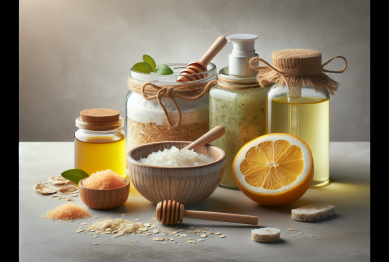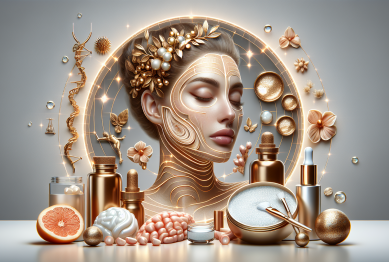Discover the real impact of collagen on skin health and the latest science behind anti-aging routines. This guide unpacks collagen’s benefits, how to naturally support production, and what to know before modifying your wellness or beauty regimen for firmer, more youthful skin.
The Power of Collagen for Radiant Skin
Collagen is often called the body’s scaffolding. This powerful protein provides structure to skin, hair, and nails, accounting for about 75% of human skin’s dry weight. As one of the most abundant proteins within the body, collagen is fundamental for skin elasticity and firmness. People aiming to maintain a glowing complexion or reduce visible aging signs pay significant attention to collagen production and its potential positive effects on beauty and overall wellness.
The natural aging process reduces collagen production every year after our mid-20s. Environmental stressors such as sun exposure, pollution, and smoking also accelerate this decrease. As a consequence, fine lines, sagging, and dullness can appear. Researchers continue to explore the link between collagen breakdown and visible skin aging, inspiring interest in both topical and oral collagen supplements as well as lifestyle strategies to support collagen health (Source: https://www.ncbi.nlm.nih.gov/pmc/articles/PMC8824546/).
Discussing skincare’s top trends is not complete without mentioning collagen’s cosmetic appeal. While topical creams containing collagen are popular, their molecules may be too large to permeate the skin effectively. As a result, boosting collagen from within—through nutrition and healthy habits—is becoming increasingly recommended by experts. Understanding how to synergize both internal and external approaches to collagen maintenance can lead to more radiant and resilient skin over time.
Everyday Habits That Impact Collagen Levels
Small daily decisions can dramatically affect your collagen reserves. For instance, overexposure to UV sunlight is scientifically recognized as a major contributor to collagen depletion. UV rays penetrate deep into the dermis, breaking down collagen fibers and triggering an imbalance in skin repair systems. Even one day at the beach without proper protection adds up over time, contributing to premature aging and uneven skin tone (Source: https://www.cdc.gov/cancer/skin/basic_info/sun-safety.htm).
Other environmental stressors, like urban pollution, can compound the harm by introducing free radicals that further fragment collagen molecules. Luckily, certain habits, such as wearing broad-spectrum sunscreen and adopting antioxidant-rich diets, can provide powerful defense. Hydration plays an understated, yet crucial, role—well-moisturized skin is better equipped to resist daily stress and maintain structural integrity for longer periods.
In addition to external care, avoid persistent habits such as smoking and excessive alcohol consumption. Both have been linked to lower collagen density and impaired skin healing. Prioritizing healthy routines, such as regular sleep and gentle skincare, does more than prevent damage. These routines may encourage the body’s natural repair processes, indirectly boosting collagen maintenance over time.
Nutrition and Collagen: What to Eat for Plumper Skin
Nutrition matters greatly in collagen synthesis. Amino acids, particularly glycine, proline, and hydroxyproline, are essential for collagen formation. These are found in protein-rich foods such as bone broth, chicken skin, fish, egg whites, and legumes. The body also needs vitamin C as a cofactor for synthesizing collagen—which makes oranges, strawberries, and bell peppers excellent beauty foods (Source: https://www.hsph.harvard.edu/nutritionsource/vitamin-c/).
Beyond vitamins and amino acids, healthy fats from sources like avocado, nuts, and olive oil support a resilient skin barrier. These foods help lock in moisture, which indirectly benefits collagen fibers by preventing them from becoming brittle or damaged. Zinc and copper are trace minerals vital for collagen cross-linking, and are present in shellfish, seeds, and whole grains.
Some studies suggest that certain foods—or supplements containing hydrolyzed collagen peptides—can help replenish the skin’s matrix when consumed regularly. However, the effects may vary by individual. A holistic diet, rich in fruits, vegetables, lean proteins, and healthy fats, remains the foundation of any effective routine aiming for visible radiance and resilience throughout the skin’s lifespan.
Collagen Supplements: Myths and Evidence
Collagen powders and capsules are now a familiar sight on health store shelves, promising more youthful skin and improved elasticity. But do they work? Research suggests hydrolyzed collagen supplements may improve skin elasticity and hydration, with some individuals noticing decreased wrinkle depth after several weeks of use. Still, results are rarely instant and depend on a consistent, long-term approach (Source: https://www.ncbi.nlm.nih.gov/pmc/articles/PMC6835901/).
There are many forms of collagen supplements on the market—derived mainly from fish, bovine, or porcine sources, sometimes labeled as types I, II, or III. It’s important to understand label transparency, check for independent testing, and consult with a healthcare professional when introducing any supplement. Some formulas may include additional nutrients like vitamin C or hyaluronic acid, aiming to support the body’s natural skin-rejuvenation processes.
While early data seems promising, not all experts agree on effectiveness. The body breaks down most ingested collagen into amino acids, which it might use for a variety of processes, not exclusively skin repair. Thus, the results can be subtle and gradual. Emphasizing a broad approach—including diet, sun protection, and self-care—often produces more comprehensive outcomes for beauty and wellness than supplementation alone (Source: https://www.nccih.nih.gov/health/collagen-supplements-what-the-science-says).
Professional Treatments for Collagen Support
Aside from daily lifestyle changes, dermatologists may offer advanced therapies designed to stimulate collagen production in targeted ways. Treatments such as microneedling, laser resurfacing, and radiofrequency activate the body’s natural healing response. This temporarily increases collagen synthesis, potentially leading to smoother and plumper-looking skin (Source: https://www.aad.org/public/cosmetic/science/collagen).
These methods are typically performed in a licensed clinic setting and require personalized consultation. Some treatments involve minimal downtime, while others may need recovery periods or repeat sessions for optimal results. It’s essential to discuss realistic expectations, potential side effects, and appropriate aftercare with qualified professionals before starting any intensive collagen-focused therapy.
Growing numbers of people also combine professional treatments with at-home regimens to prolong results. Consistent sun protection, hydration, and gentle products are recommended to build upon the benefits achieved in clinical settings. Though technology continues to innovate, experts agree results are maximized when professional care is supported by a healthy daily routine and balanced nutrition.
Building a Sustainable Collagen Routine
What sets apart a sustainable beauty routine is the ability to maintain positive habits over the long haul. Incorporating gentle facial massage or facial exercise can help stimulate blood flow and potentially support healthy skin structure. These inexpensive tools add enjoyable moments of self-care into a daily beauty ritual, delivering benefits that simple products cannot always achieve alone.
Mindful stress management also has an overlooked impact on skin. Chronic stress increases the body’s production of cortisol, a hormone that can weaken the collagen matrix and encourage early aging signals. Techniques such as yoga, mindfulness, or regular deep breathing may indirectly help sustain youthful energy and skin vibrancy by supporting internal equilibrium (Source: https://www.psychologytoday.com/us/basics/stress/stress-health).
There’s no single “magic bullet” for beauty. Instead, collagen health thrives on consistency, informed routines, and openness to adjusting strategies with time. Staying updated on research, consulting trusted professionals, and listening to individual results within a broader wellness plan are hallmarks of an effective, science-based approach to beauty and aging well.
References
1. Sibilla S., Godfrey M., Brewer S., et al. (2015). An Overview of Collagen and Its Applications in Dermatology. Retrieved from https://www.ncbi.nlm.nih.gov/pmc/articles/PMC8824546/
2. Centers for Disease Control and Prevention. (2022). Sun Safety. Retrieved from https://www.cdc.gov/cancer/skin/basic_info/sun-safety.htm
3. Harvard T.H. Chan School of Public Health. (2022). Vitamin C. Retrieved from https://www.hsph.harvard.edu/nutritionsource/vitamin-c/
4. Zague, V., de Freitas, V., da Costa Rosa, M. et al. (2019). Collagen peptides supplementation: beneficial effects on skin health? Retrieved from https://www.ncbi.nlm.nih.gov/pmc/articles/PMC6835901/
5. National Center for Complementary and Integrative Health. (2022). Collagen Supplements: What the Science Says. Retrieved from https://www.nccih.nih.gov/health/collagen-supplements-what-the-science-says
6. American Academy of Dermatology Association. (2022). Collagen and skin: What you need to know. Retrieved from https://www.aad.org/public/cosmetic/science/collagen









